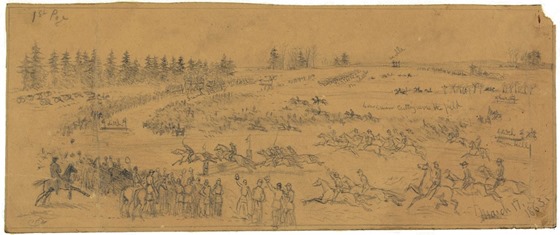April 16.—We have had trouble in the wash-house; some one told Dr. Patterson that the three girls who came from Mobile had been dancing with some negroes, and that last Sunday they walked to the graveyard with one.
The first I have been told is positively a falsehood; the second, I had heard before. When told of it, I laughed, and said I expected it was another case of “Dame Blaize,” “whom the king himself did follow as she walked on before.” I suppose the girls were walking, and the negro happened to be going the same road; as I feel confident, from what I have seen of them, they would not knowingly do a wrong of that kind. Dr. P. had dismissed them. When I told him I did not believe any of the stories, he said he sent them off out of respect to the ladies in the hospital, and if we wished he would countermand the order. The girls were sent back, but in a little while came and told me that one of the non-commissioned officers in the hospital had gone into the wash-house, and spoken insultingly to them on the subject. I sent for Dr. P. and told him the circumstance; he was very angry, and said he would dismiss the man, as he would have no one in the hospital who did not behave properly. These are a few of the trials of hospital life, and I think they are serious ones; but I feel sure we shall have no more trouble on that score, as Dr. P. will not permit it.
Miss G.’s health has been so feeble that she has been compelled to leave for home; she left yesterday; I went as far as Atlanta with her. Dr. O’Neal, an assistant surgeon of the Gilmer Hospital, accompanied us. He gave me an account of the death of Captain De Graffenread, the Tennessean.
He had been moved to the Gilmer Hospital, as it belongs to Polk’s corps; he died very suddenly; a blood-vessel ruptured, and alarmed him so much that Dr. O’Neal thinks he died from fright. He was about fifty years of age. From all I have been told, I do not expect we had a braver man in the army; his men fairly idolized him, and the negro servant who nursed him cried like a child when he informed me of his death. His sister and brother-in-law came to see him; but too late, as he was dead and buried before they reached here. I have been told that they were indignant at his treatment in our hospital. They said: “To think that a man of his means should have been kept in a ward like any other soldier!” If they had come to me about him, I should have informed them, I was certain he was too good a soldier to have wished to be any place else. His own people could not have taken better care of him than he had from every one here. He had the best of medical attention, and as his case was a bad one, I prepared his food myself. He got the very best of what we had in the hospital—which was a good deal, as at that time we had the box of things sent from Mobile. Poor fellow! all these things do not trouble him now. He was not religious. “Leaving his sins to his Savior,” let us think of him only as the hero he was.
“Then on rapturous bosoms let gratitude swell,
For this son of renown, who so gloriously fell,
And while fancy leads on to his cold, hallowed grave,
We shall echo a sigh to the manes of the brave.”
Dr. O’Neal met with a lady and gentleman going to Mobile, who kindly consented to take charge of Miss G. We put up at a hotel; I do not know its name. We remained there about two hours, for which we paid one dollar each.
In the cars, on my way back, I met a Mr. Pritchard from New Orleans. He related some of his trials before being sent out of that city. He also told me about a dinner given in Montreal, Canada, and that at it President Davis, Generals Lee and Jackson, had been highly complimented. I wonder the people there are not afraid to commit such a breach of international law!
Mrs. Dr. Turner was on the train, going to pay her husband another visit. She had just come from Alabama. She told me her brother had never got his coat and shawl from the Trout House. We met Colonel McNair of the Fourth Mississippi Cavalry. He had just come from Mississippi.
The cars were loaded with troops from Mobile, going to reinforce Bragg; among them were some Georgia regiments; their relatives were at the different depots to meet and take a look at them before they went up to the army. The banks all the way along were lined with ladies, waving their handkerchiefs, and throwing bouquets to the soldiers, greeting them with much enthusiasm, which the soldiers seemed to appreciate by cheering the ladies in return.
I was informed that the Thirty-sixth and Thirty-eighth Alabama Regiments were on the train; as I had some friends in them, I tried to see them, but failed; the train they were on stopped a half mile from the depot, so I was unable to see them at that time.
I noticed the country through which we passed was barren and poor-looking, and the people had a sickly appearance.










